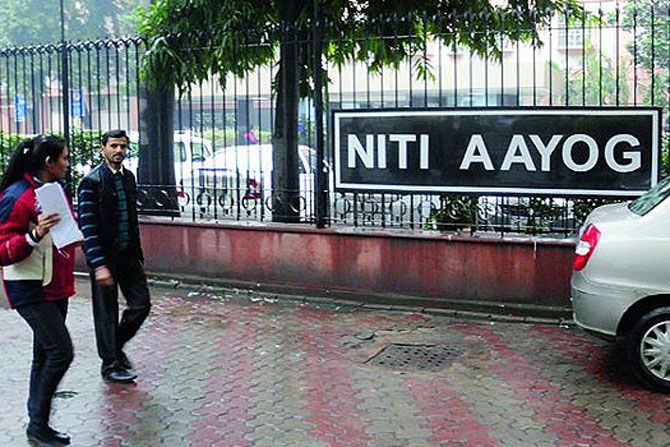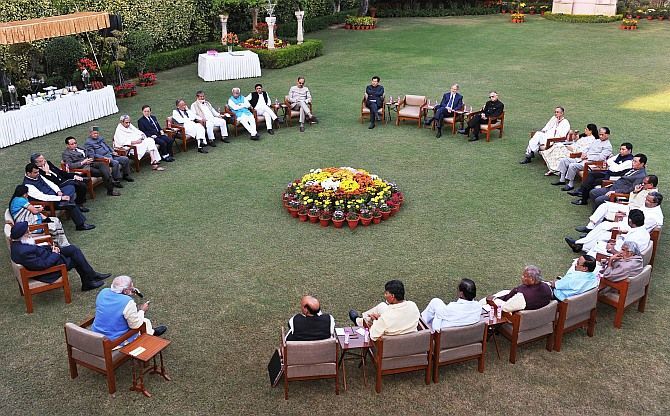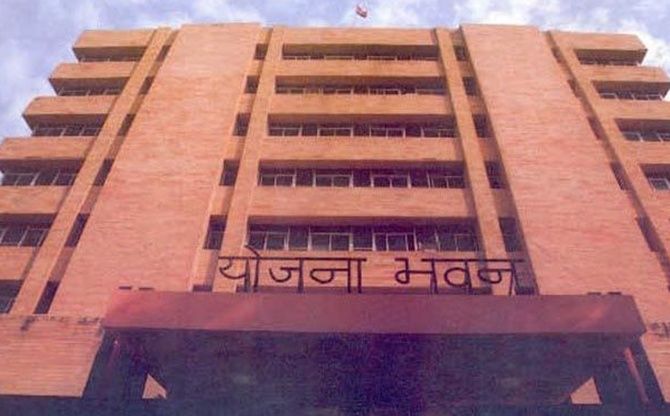
'A lot will depend on the first Aayog and the power it derives.'
Rashme Sehgal on what we can expect from the Planning Commission's replacement.
One of the main edifices of the Nehruvian era, the 60-year old Planning Commission, has been disbanded to be replaced by the National Institute for Transforming India, NITI Aayog.
Till six months ago, the all powerful Planning Commission housed in the five-storied Yojana Bhavan was a place of pilgrimage for chief ministers and state secretaries who had to ensure the deputy chairman, with a sleight of his hand, did not decrease their state's budgetary allotment.
For the last decade, the annual photo op of these chief ministers locked in a hand shake with the then deputy chairman, the all powerful Montek Singh Ahluwalia, under the shadow of the Rajasthani chad painting is now a thing of the past.
Dr M S Swaminathan, a leading agricultural scientist, and closely associated with the Planning Commission from its inception points out, "It was set up by our first prime minister Jawaharlal Nehru as a powerful tool for national integration. Its mandate was to conduct a major resource management exercise in order to ensure equitable development through a series of five-year plans."
The NITI Aayog will have Prime Minister Narendra Modi as its chairman with the well known economist Arvind Panagariya as its vice-chairman. It will also have a CEO, five full-time members and up to two part-time members from leading universities and research organisations apart from four ex-officio members from the Union council of ministers nominated by the prime minister.
The key issue before the country is what exactly is the role being determined for this new body. Will it continue with the functions traditionally associated with the Planning Commission or will it focus largely on policy issues?
If the Cabinet note on the new entity is any indication, the body is unlikely to allocate funds or devise five-year and annual plans as was being done by the Planning Commission. There is also a question mark on its other key role regarding allocation of resources to state governments.
The earlier plan allocation to states was being done through the Gadgil-Mukherjee formula. "We have to see how it will be worked out under the new dispensation. The Gadgil-Mukherjee formula has relevance because it ensured well-to-do states had to spare resources and money for the less prosperous ones," says Dr Swaminathan.
"Another question mark is regarding the issue of discretionary funding which also lay in the domain of the Planning Commission," adds Dr Swaminathan, who was instrumental in introducing the two key elements of women in development and the key roles of environment and ecology for the Sixth Five Year Plan.
It seems as though the death knell has been sounded on the five-year plans, a process that was started in the 1950s. Even if the new body focuses on long-term planning and policy formulation and coordination, it is unlikely to do so through five-year plans.
There is a fundamental question mark on just how different will the objectives and functions of this new entity be.
"A lot will depend on the first Aayog and the power it derives," says Dr Pronab Sen, chairman of the National Statistical Commission and one of the longest-serving principal advisors to the Planning Commission.
Dr Sen believes the NITI Aayog will examine all the government's present economic policies. One of its members -- V K Saraswat, former director-general, Defence Research and Development Organisation -- is someone with experience in the field of national security, since this is an area the government plans to give additional thrust to.
Dr Sen insists these changes are warranted.
 "The Planning Commission was set up to be a body for experts, but for the last ten years, all direct recruitment to it had been stopped and vacancies were being filled by bureaucrats. As a result it had become a body largely of bureaucrats rather than experts," says Dr Sen.
"The Planning Commission was set up to be a body for experts, but for the last ten years, all direct recruitment to it had been stopped and vacancies were being filled by bureaucrats. As a result it had become a body largely of bureaucrats rather than experts," says Dr Sen.
Image: Prime Minister Narendra Modi with state chief ministers at a meeting on replacing the Planning Commission. Photograph: Press Information Bureau
"In the government system," he adds, "it is very difficult to turn around an organisation. It is easier to shut it down and resurrect it as a new body under a different name."
Traditionally, the Planning Commission's role, Dr Sen points out, has not been to disburse funds as much as to act as the role of an aggregator which collected information on behalf of all the ministries and then provided the nation with an overall integrated picture.
"Without one unified body, the states will be forced to deal with each ministry on an individual basis but that will only result in more problems for them. We still don't know who is going to provide an overall unified picture," Dr Sen adds.
"The finance ministry can also do it, but it is a complicated job. To cite one example, the Planning Commission had made a provision for the construction of rural roads. Two states, Punjab and Tamil Nadu did not require roads as they have already linked their villages with pucca roads. The question before us was how do we compensate them and where can we make the adjustments," he says.
Dr Sen questions who would handle the special purpose grants meant for backward areas. "There is no clarity on this issue," he feels
Nor does he agree with the perception that chief ministers belonging to states run by Opposition parties received step-motherly treatment having had to cool their heels outside Montek Singh Ahluwalia or his predecessors's office.
"On the contrary, my experience was that members of the Planning Commission bent over backwards to please those leaders who belonged to the Opposition," says Dr Sen.
"We went out of our way to help those who belonged to a different political dispensation, and especially those from the weaker states," says Syeda Hameed, who spent a decade as a member of the Planning Commission during Dr Manmohan Singh's prime ministership.
Hameed cites the example of the north-eastern states who she says "never have enough to meet their non-Plan expenditure. We worked very hard to raise funds for them."
She worked closely with states in the areas of malnutrition, maternal mortality and infant mortality. "In all these areas," she says, "we adopted a multi-sectoral approach where different ministries had to join hands to work together."
"We were also closely involved with civil society and NGOs to ensure the delievery systems reached the last mile. We helped to make ministries accountable, help them achieve their goalposts," she asserts.
Economist Manisha Priyam does not agree. "I think these five-year plans represented a very insensitive top-down command model in which the levers of power were controlled in a very asymmetrical manner. I think Modi wants to introduce a competitive federalism which will be very healthy for the nation," says Priyam.
Hameed is upset that so far no woman member has been appointed to the Niti Aayog. It was primarily due to her initiative that gender economy entered the mainstream of governance and has remained so. "We were constantly in the field and discouraged people from sitting in their offices," she says.
The new appointees, Hameed adds, "too will have to go out into the field -- inko miti ki khusbhu to aani chahiya (they must smell the scent of the earth)."
The announcement of the Niti Aayog finds itself caught in politics. Minister of Commerce and Industry Nirmala Sitharaman has stated, 'With the new set of changes, the state governments no longer need to have a begging attitude and instead take independent steps for development.'
The Opposition has questioned the government's rechristening of the Planning Commission as Niti Aayog with the Congress demanding to know whether the reform introduced by the Bharatiya Janata Party-led government was premised on any meaningful programme or simply born out of political opposition.
"The real issue is do you (the government) have a substantive meaningful programme to reform the Planning Commission?" asks Congress spokesperson Abhishek Manu Singhvi.
 "Does the BJP government want to abolish the Planning Commission, because it is something which (Jawaharlal) Nehru created for this country and you don't like Nehru or simply because it was run by the Congress for 60 years and you don't like the Congress. If that is so, it is pitiable," he says.
"Does the BJP government want to abolish the Planning Commission, because it is something which (Jawaharlal) Nehru created for this country and you don't like Nehru or simply because it was run by the Congress for 60 years and you don't like the Congress. If that is so, it is pitiable," he says.
The Communist Party of India-Marxist felt a mere change in the name would not yield the desired results.
"Mere changing this nomenclature, and this sort of gimmickry is not going to serve the purpose. Let us wait and see what the government is eventually planning," says CPI-M leader Sitaram Yechury, wondering why the Planning Commission Web site has been archived.
BJP-ruled states like Goa and Madhya Pradesh have supported the changeover.
Already, the finance ministry has directed all major ministries and departments to furnish their Plan Budget estimates for 2015-2016 directly to it. Earlier, these were routed through the Planning Commission. State governments too are discussing their annual plan expenditure estimates with the finance ministry.
Arun Maira, another former member of the Planning Commission, believes the new entity could well be better suited to serve present day economics especially in a fast changing global era, especially since the five-year plan process, though good, had not proved sufficiently effective.
"I feel a big challenge for the new government will be in finding people with adequate expertise and skills to man this body, says Maira.
As the corridors of Yojana Bhavan are being painted and a new name plate adorns this building, policy makers at the Centres and in the states wait to see the nature of changes that will be ushered in in coming weeks.











 © 2025
© 2025